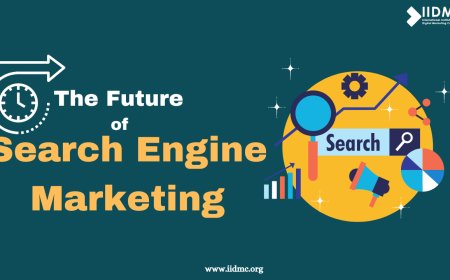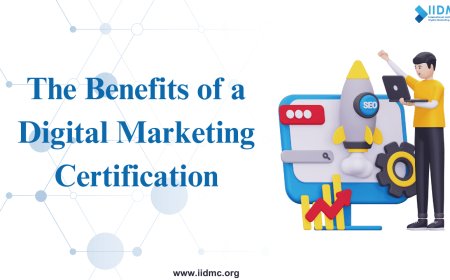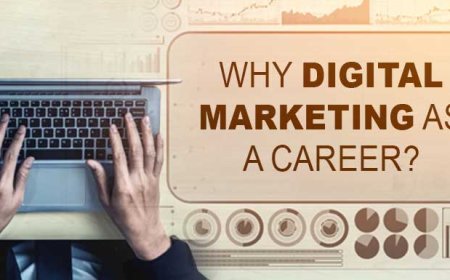Online digital marketing certification
Earn your online digital marketing certification and gain essential skills in SEO, social media marketing, PPC, content strategy, and more. Boost your career with expert-led courses and hands-on experience in digital marketing.
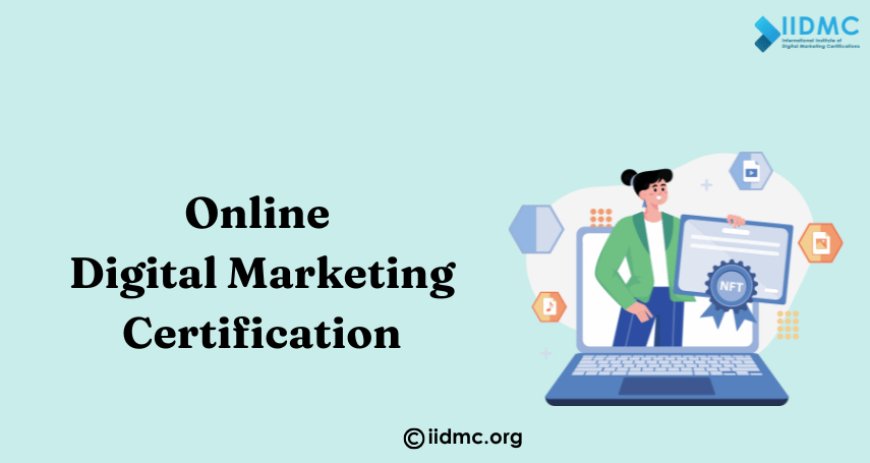
Digital marketing has become critical for companies to stay competitive and relevant. With the rise of online platforms and consumer behavior shifting towards digital interactions, businesses must adapt their marketing strategies to engage audiences effectively. From social media campaigns to search engine optimization (SEO), the ability to harness digital marketing tools is no longer optional; it's essential. Companies use digital marketing to expand their reach and gain valuable insights into customer preferences and behaviors, allowing for more targeted and efficient marketing efforts.
Understanding Digital Marketing
Digital marketing refers to the use of digital channels, platforms, and technologies to promote products or services, engage with customers, and drive conversions. It includes a wide range of online marketing activities that use the internet and electronic devices to reach target audiences effectively.
Key Components of Digital Marketing
-
Definition: SEO involves optimizing a website to rank higher in search engine results pages (SERPs) for relevant keywords. It aims to increase organic (non-paid) traffic to a website.
-
Key Practices: Keyword research, on-page optimization (like title tags and meta descriptions), technical SEO (site speed, mobile friendliness), and backlink building.
-
Content Marketing
-
Definition: Content marketing focuses on creating and distributing valuable, relevant content to attract and engage a target audience. The goal is to drive profitable customer action.
-
Key Formats: Blog posts, articles, videos, infographics, podcasts, eBooks, and case studies.
-
Definition: This involves using social media platforms (such as Facebook, Twitter, Instagram, and LinkedIn) to connect with audiences, build brand awareness, and drive engagement.
-
Key Activities: Creating and sharing content, engaging with followers, running ads, and monitoring social media metrics.
-
Email Marketing
-
Definition: Email marketing involves sending targeted emails to get leads, communicate with customers, and promote products or services.
-
Key Strategies: segmentation, personalization, automation, and A/B testing to improve open and click-through rates.
-
Pay-Per-Click Advertising (PPC)
-
Definition: PPC is a model of online advertising where advertisers pay each time a user clicks on their ad. It includes search ads, display ads, and social media ads.
-
Key platforms: Google Ads, Bing Ads, Facebook Ads, and Instagram Ads.
Benefits of Online Digital Marketing Certification
1. Credibility: A digital marketing certification shows employers you have the right skills and knowledge. It helps you stand out when applying for jobs.
2. Skill Development: Certification programs teach you important skills like SEO, social media, and analytics. You get hands-on experience with tools that help you run effective marketing campaigns.
3. Career Advancement: Having a certification can help you get promoted or find better job opportunities. Employers like hiring certified candidates for specialized roles, which can lead to leadership positions and higher pay.
4. Networking Opportunities: Certification programs let you connect with other professionals and experts. This can lead to job opportunities and collaborations, and help you stay updated on industry trends.
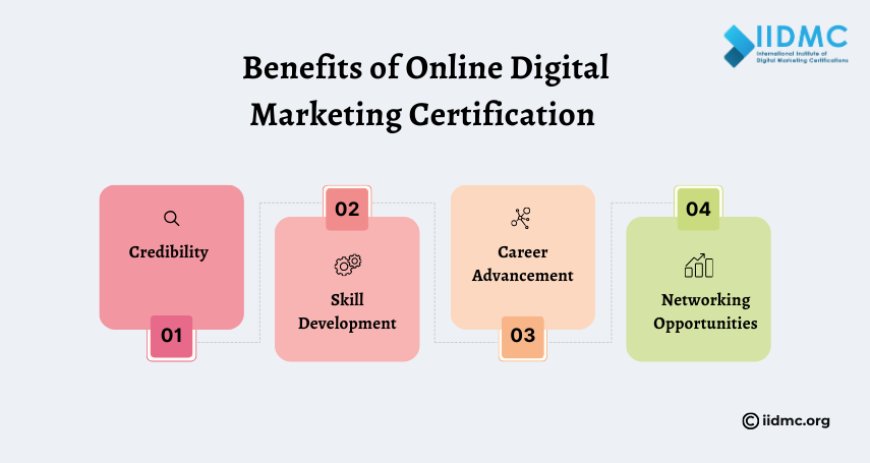
Choosing the Right Certification Program
When looking to improve your skills in digital marketing through a certification program, several factors come into play. Here’s a breakdown of the key considerations and a comparison of popular certification programs.
Factors to Consider
-
Course Content
-
Relevance: Ensure that the curriculum covers the key components of digital marketing, such as SEO, content marketing, social media marketing, email marketing, and PPC.
-
Up-to-date Information: The field of digital marketing is rapidly changing, so look for programs that include the latest trends and tools.
-
Duration
-
Time Commitment: Check how long the program will take to complete. Programs can range from a few weeks to several months. Choose one that fits your schedule and learning pace.
-
Flexibility: Many online programs offer self-paced options, allowing you to learn at your convenience.
-
Cost
-
Tuition Fees: Compare the costs of different certification programs. Some are free, while others can be quite expensive.
-
Return on Investment: Consider the potential career benefits and salary increases that could come from obtaining a certification.
-
Provider Reputation
-
Accreditation: Look for programs from reputable institutions or organizations. Accreditation can be a sign of quality.
-
Alumni Success: Research what past participants have achieved after completing the program, such as job placements or promotions.
Steps to Enroll in an Online Certification Program
-
Research Programs
-
Identify Your Goals: Determine what skills you want to acquire and which areas of digital marketing you wish to focus on.
-
Compare Options: Look for programs that align with your goals, considering factors like course content, duration, cost, and provider reputation (as discussed previously).
-
Check admission requirements.
-
Prerequisites: Some programs may have prerequisites or require a certain level of prior knowledge. Ensure you meet these before applying.
-
Create an Account
-
Sign Up: For most online platforms, you’ll need to create an account. This typically involves providing your email address and creating a password.
-
Fill Out Application
-
Application Process: Complete any required application forms. This may involve providing personal information, educational background, and work experience.
-
Payment Process
-
Tuition Fees: If applicable, proceed with payment. Ensure you understand the payment options available, including installment plans or financial aid if offered.
-
Access Course Materials
-
Get Started: Once enrolled, you will receive instructions on how to access course materials. Familiarize yourself with the learning platform and its features.
Obtaining an online digital marketing certification is a valuable step for anyone looking to enhance their career. Certifications validate skills and knowledge, increasing credibility with employers while providing essential tools and techniques. The International Institute of Digital Marketing Certification (IIDMC) is particularly recognized for its comprehensive programs, helping learners effectively navigate the complexities of digital marketing. As demand for skilled marketers continues to grow, having a certification improves your resume and opens up new job opportunities and networking connections. Additionally, gaining practical experience alongside certification is crucial for standing out in a competitive job market. Combining theoretical knowledge with real-world application positions you as a strong candidate. Investing in a digital marketing certification from a reputable provider like IIDMC can be key to unlocking your potential in this evolving industry.



























